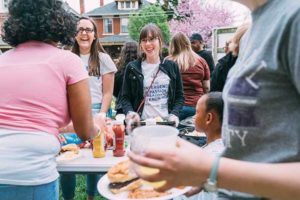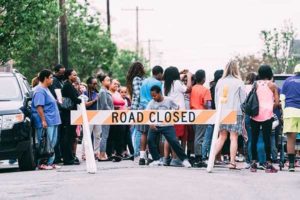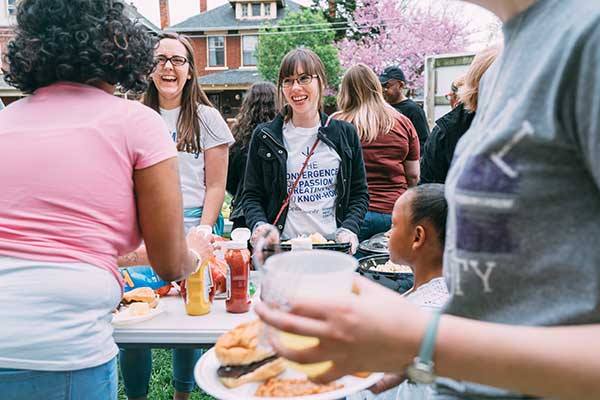Service-based learning is becoming a standard in higher education, and Capital has many opportunities available to students and organizations that want to make a difference.
One of the longest-standing partnerships the university has is with the First English Lutheran Church in the Near East community. This area is just down Main Street from campus, and the partnership goes back “probably more than a decade” according to Deanna Wagner, dean of engagement and success.
This past fall, students in professor Sherry Mong’s social problems class and professor Nate Jackson’s ethics class worked with First English Lutheran Church on their community dinner on Thursday nights.

The pastor of the church felt that the volunteers weren’t sure how to interact with the community members they were serving. To fix the issue, students in Mong and Jackson’s classes made handouts for volunteers that explained poverty and other issues that community members at the dinner might face.
In-classroom service work isn’t limited to classes focused on social issues, though. Students in one of Betsy Pike’s classes created commercials for small businesses in the Near East community.
Outside of the classroom, some students are involved in helping with the First English Lutheran’s Kids Kamp that happens every Saturday. After a suggestion last year by Jack Spiller and Kelsey Mitchell, student interns in the student and community engagement office, this kids camp is held on campus once a semester. The kids get breakfast, get to do a few hours of activities and then get lunch.
“We usually have 30 or 40 people who volunteer and get up at 8 a.m. or earlier … to be apart of that day,” Wagner said.
Spiller said he and Mitchell wanted to “bridge the gap” between Capital and the Near East community by bringing the Kids Kamp to Capital.
“We hoped that it would show them that Capital’s doors are always open to anyone from our surrounding communities,” Spiller said. “I think it’s been a huge success…we have kids come multiple times and have been able to establish real connections with them and show them everything Capital has to offer.”
Spiller says that Kids Kamp is one of his favorite service events, along with the block party Capital hosts with First English every year.
“Going to the First English church for the block party, I have been able to witness the strength of the community around First English first hand, and everyone there immediately made me feel apart of the community,” Spiller said.

Through the university’s partnership with First English Lutheran Church, Wagner says other community partnerships, such as with Central Community House and other community churches, are growing.
President Beth Paul hopes to expand the university’s partnerships to the Driving Park neighborhood, which is near campus on Livingston Avenue. Students involved in the Bonner program, a service-oriented program that started this year, are currently working with this community and forming partnerships.
Service-based learning is something Capital prides itself in, and it does just as much for the community as it does for the students who volunteer.
“It gives students an opportunity to see a community that is maybe different than the one they were raised in, or if they were raised in that community, to show the gifts that that community can bring,” Wagner said. “… And from a research perspective, we know that students learn better when they’re doing.”
Mong said that implementing service into her classroom enhances what students get out of her sociology classes.
“I can sit and lecture about social problems, but that doesn’t make the impact on students as much as actually getting out and working with people to bring about change,” Mong said. “[The students] can see the things that they’re reading about play out…they can see how policy impacts people, they can listen to the people it’s affecting.”
From a student perspective, Spiller said there is so much to learn from the communities surrounding campus and says the experience is “transformative.”
“Engaging with the people in the Near East side has been one of the best parts of my college career and has really changed my perspective on community engagement,” Spiller said. “I encourage everyone to volunteer at least once with the amazing communities we have around us because [students] will get just as much out of it as the people living in the communities will.”


